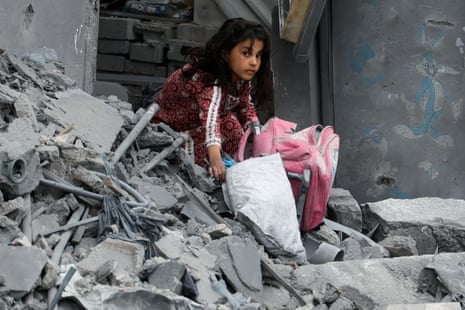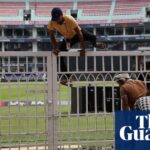Israeli military issues forced evacuation order for parts of northern Gaza
The IDF has issued a forced evacuation order to residents in parts of northern Gaza: Beit Hanoun, Beit Lahiya and the neighbourhoods of Sheikh Zayed, al-Manshiya and Tal al-Zaatar.
Avichay Adraee, an Arabic language spokesperson for the Israeli army, said it is a “final” warning before the “raid”.
“We have warned about this area many times. For your safety, you must move immediately west to the known shelters in Gaza City,” he wrote in a post on X this morning.

It comes a day after the Israeli military ordered a sweeping evacuation order for the southern city of Rafah and parts of neighbouring Khan Younis – the biggest since the war resumed last month when Israel broke the ceasefire agreement with Hamas by launching a wave of airstrikes that killed hundreds of Palestinian people, including many women and children.
The IDF claims the evacuation orders are issued to protect Palestinian civilians from Hamas fighters who the Israeli military says are using civilians as human shields.
The UN has said the evacuations have failed to comply with the requirements of international law, as Israel is accused of failing to provide adequate health or safety conditions to civilians forced to flee.
Yesterday, residents in parts of southern Gaza were advised to leave immediately for the al-Mawasi “humanitarian zone”, a narrow strip of coastline at the southernmost end of the strip. But there have been many deadly Israeli airstrikes in the zone so there is no guarantee of safety there.
Key events
Closing summary
-
The IDF has issued a forced evacuation order to residents in parts of northern Gaza: Beit Hanoun, Beit Lahiya and the neighbourhoods of Sheikh Zayed, al-Manshiya and Tal al-Zaatar. Avichay Adraee, an Arabic language spokesperson for the Israeli army, said it is a “final” warning before the “raid”. “We have warned about this area many times. For your safety, you must move immediately west to the known shelters in Gaza City,” he wrote in a post on X this morning.
-
Hezbollah lawmaker Ibrahim Moussawi said the Israeli attack on Beirut that killed at least four people amounted to “a major and severe aggression that has escalated the situation to an entirely different level”. Speaking in a televised statement after visiting the building that was struck, he called on the Lebanese state to “activate the highest level of diplomacy to find solutions”.
-
At least 50,399 Palestinian people have been killed and 114,583 injured in Israeli attacks on Gaza since 7 October 2023, the Gaza health ministry said in a statement on Tuesday. At least 42 bodies and 183 injured people have been received by hospitals in Gaza over the last day, according to the territory’s health ministry, which said that at least 1,042 Palestinian people have been killed by Israeli forces since Israel broke the ceasefire with Hamas on 18 March.
-
Amjad Al Shawa, director of the Palestinian NGOs Network (PNGO), an umbrella group of 30 Palestinian NGOs and ActionAid’s partner in Gaza, has warned that Gaza will probably enter a “new cycle of famine, starvation and thirst” in the coming days as bakeries across the strip are forced to close because of fuel and flour shortages caused by the ongoing Israeli aid blockade.
-
The World Food Programme says it’s immediately closing all of its bakeries in Gaza after a month-long blockade by Israel into the strip, the Associated Press reports. In an internal memo circulated among aid groups, the UN agency said that due to the lack of humanitarian aid, its supplies are running out and it doesn’t have enough wheat flour needed to make bread. The agency said it’s distributed all available food rations, and there are no more stocks.
-
Unicef, the UN humanitarian aid organisation for children, has said at least 322 children have reportedly been killed and 609 injured since the resumption of Israel’s “intense bombardments” and “ground operations” in the Gaza Strip on 18 March. In a press release, Unicef wrote: “The breakdown of the ceasefire and resumption of intense bombardments and ground operations in the Gaza Strip has reportedly left at least 322 children dead and 609 injured – constituting a daily average of around 100 children killed or maimed over the past 10 days. Most of these children were displaced, sheltering in makeshift tents or damaged homes.”
-
UK foreign secretary David Lammy has said the UK “categorically” condemns the expansion of Israeli settlements in the West Bank during a session in parliament, warning that they do not enhance Israeli security and undermine the prospect of a two-state solution for Israelis and Palestinians. “I’m clear with my Israeli counterparts that settlement expansion must stop. We will continue to work with our partners to ensure the prospects for a Palestinian state”, said Lammy.
-
One year after Israel’s killing of three British aid workers employed by World Central Kitchen, the family of James Kirby, one of those killed, said they had still not received answers from the British government. The three British citizens were killed in an Israeli airstrike despite their vehicle being clearly marked. Seven aid workers were killed in the strikes to which the Israel Defence Forces (IDF) admitted took place. Two IDF members were dismissed.
-
US president Donald Trump said on Tuesday he spoke with Egyptian president Abdel Fattah al-Sisi and discussed topics including military progress against Yemen’s Iranian-backed Houthis and possible solutions in Gaza. Trump said the call went very well, Reuters reported.
Thanks for following along. That’s all from me, Tom Ambrose, and the Middle East crisis live blog for today.
Palestinians held funerals Monday for 15 medics and emergency responders killed by Israeli troops in southern Gaza, after their bodies and ambulances were found buried in an impromptu mass grave, apparently plowed over by Israeli military bulldozers.
This map shows the location of their deaths:
US president Donald Trump said on Tuesday he spoke with Egyptian president Abdel Fattah al-Sisi and discussed topics including military progress against Yemen’s Iranian-backed Houthis and possible solutions in Gaza.
Trump said the call went very well, Reuters reported.
Family of British aid worker killed in Gaza say they still have not received answers from the UK government

Patrick Wintour
Patrick Wintour is diplomatic editor for the Guardian
One year after Israel’s killing of three British aid workers employed by World Central Kitchen, the family of James Kirby, one of those killed, said they had still not received answers from the British government.
The three British citizens were killed in an Israeli airstrike despite their vehicle being clearly marked. Seven aid workers were killed in the strikes to which the Israel Defence Forces (IDF) admitted took place. Two IDF members were dismissed.
Louise Kirby said the pain of losing her cousin James remains ever-present, but adds “what has been equally devastating is the lack of justice and accountability. Despite repeated calls for answers, the family continues to be met with silence and no substantial action from the UK government.
She said it was “disheartening” that after all this time “we still have no concrete proof of accountability from any responsible party. The government’s response has been nothing but empty apologies, which are and will never be sufficient. My family and I remain deeply concerned that breaches of policy or laws may have possibly occurred, which is possibly why the government has failed to engage meaningfully with us”.
She said the family were still calling for a formal in depth investigation presented to an unbiased court. “We want justice for James and the truth to be known, no matter how difficult or uncomfortable that may be.”
In the Commons the middle east minister Hamish Falconer urged the Israeli military forces speedily to complete its investigation into whether criminal proceedings were going to be taken in relation to the incident.
Charity warns ‘new cycle of famine and starvation’ will hit Gaza in coming days unless Israel lifts aid blockade
Amjad Al Shawa, director of the Palestinian NGOs Network (PNGO), an umbrella group of 30 Palestinian NGOs and ActionAid’s partner in Gaza, has warned that Gaza will likely enter a “new cycle of famine, starvation and thirst” in the coming days as bakeries across the strip are forced to close because of fuel and flour shortages caused by the ongoing Israeli aid blockade.
The people of Gaza are totally dependent on humanitarian aid…We are warning that in the coming days, the bakeries which produce bread and community kitchens which produce meals will stop. This means Gaza will (go into) a new cycle of famine, starvation and thirst, which will be the worst that Gaza witnessed.
This is the real time for the international community to intervene, to pressure Israel to respect international law, to reopen the crossings, to stop its attacks on Palestinian civilians. To get justice for the victims, protection for children, women and elders.
The warning comes after the head of the Bakery Owners Association said it had been told by the UN World Food Programme (WFP), which supports 18 bakeries across Gaza, that flour had run out in its warehouses.
“The bakeries will no longer operate until the occupation opens the crossings and allows the necessary supplies to enter. We call on the world to pressure the occupation to open the crossings to prevent the famine from worsening in the Strip,” Abdel Nasser al-Ajrami was quoted by Al Jazeera as having said.
The World Food Programme says it’s immediately closing all of its bakeries in Gaza following a monthlong blockade by Israel into the strip, the Associated Press reports.
In an internal memo circulated among aid groups, the UN agency said that due to the lack of humanitarian aid, its supplies are running out and it doesn’t have enough wheat flour needed to make bread.
The agency said it’s distributed all available food rations, and there are no more stocks.
For a month Israel has shut off all sources of food, fuel, medicine and other supplies for the Gaza Strip’s population of more than 2 million Palestinians. It’s the longest blockade yet of its 17-month war on Gaza, with no sign of it ending.
Aid workers have stretched supplies, but warn of a catastrophic surge in severe hunger and malnutrition.
The office of the Israeli prime minister, Benjamin Netanyahu, said at the start of March it was imposing a blockade on Gaza because Hamas would not accept a plan which it claimed had been put forward by the US special envoy, Steve Witkoff, to extend phase one of the ceasefire and continue to release hostages, and postpone phase two, which envisaged an Israeli withdrawal from the Gaza Strip.
The Egyptian foreign ministry has accused Israel of using starvation as “a weapon against the Palestinian people”, comments echoed by Qatar which said it “strongly condemns” Israel’s blockade.
Describing the banning of aid as a “collective punishment” on Gaza’s population, overwhelmingly “children, women and ordinary men,” the head of the UN agency for Palestinian refugees (Unrwa), Philippe Lazzarini, has called for the siege to be lifted immediately.
Over 320 children reportedly killed in Gaza since Israel broke ceasefire in mid March
Unicef, the UN humanitarian aid organisation for children, has said at least 322 children have reportedly been killed and 609 injured since the resumption of Israel’s “intense bombardments” and “ground operations” in the Gaza Strip on 18 March.
In a press release, Unicef wrote:
The breakdown of the ceasefire and resumption of intense bombardments and ground operations in the Gaza Strip has reportedly left at least 322 children dead and 609 injured – constituting a daily average of around 100 children killed or maimed over the past 10 days. Most of these children were displaced, sheltering in makeshift tents or damaged homes.
These figures include children who were reportedly killed or injured when the surgical department of Al Nasser hospital, in southern Gaza, was struck in an attack on 23 March.
The resurgence of relentless and indiscriminate bombardments, combined with the complete block on supplies entering the Gaza Strip for more than three weeks, has put the humanitarian response under severe strain and Gaza’s civilians – especially its one million children – at grave risk.
Faisal Ali
UK foreign secretary David Lammy has said the UK “categorically” condemns the expansion of Israeli settlements in the West Bank during a session in parliament, warning that they do not enhance Israeli security and undermine the prospect of a two-state solution for Israelis and Palestinians.
“I’m clear with my Israeli counterparts that settlement expansion must stop. We will continue to work with our partners to ensure the prospects for a Palestinian state”, said Lammy.
Asked by Tory MP Kit Malthouse whether the UK would take more concrete action against settlers – including a possible trade ban on products from settlements, sanctions, and proscribing Israeli organisations that carry out attacks against Palestinian civilians – Lammy said he had announced sanctions in October and would keep those measures under review but did not outline any new measures the UK government was planning.
Brian Leishman, a Scottish Labour MP, asked whether the UK was still exporting British-made F-35 parts to Israel in light of its aerial bombardment of Gaza since Israel violated the ceasefire on 18 March.
Hamish Falconer, a minister in the Foreign Office, did not give a direct response to the question but said the UK government would “continue to press these issues with the Israeli government”.
Four people have been killed and at least seven injured in an Israeli airstrike on Beirut’s southern suburbs early on Tuesday, the Lebanese health ministry said. Here is a video of the aftermath of the attack:
Hezbollah lawmaker Ibrahim Moussawi said the Israeli attack on Beirut that killed at least four people amounted to “a major and severe aggression that has escalated the situation to an entirely different level”.
Speaking in a televised statement after visiting the building that was struck, he called on the Lebanese state to “activate the highest level of diplomacy to find solutions”.
Jeanine Hennis, the UN special coordinator for Lebanon, meanwhile, wrote in a post on X that “with the Lebanese Government taking positive steps and gradual returns to northern Israel, further escalation is the last thing anyone needs.”










